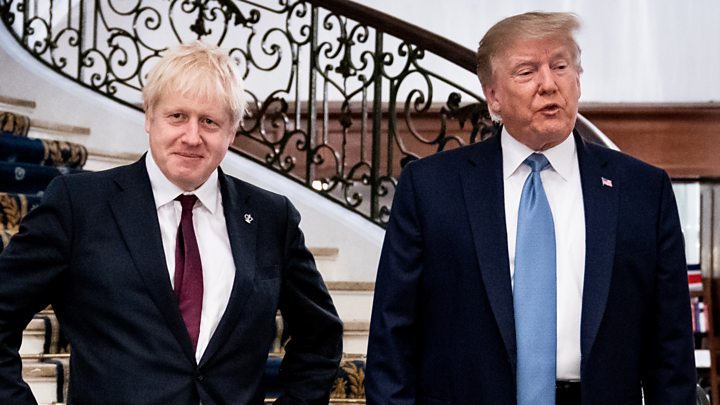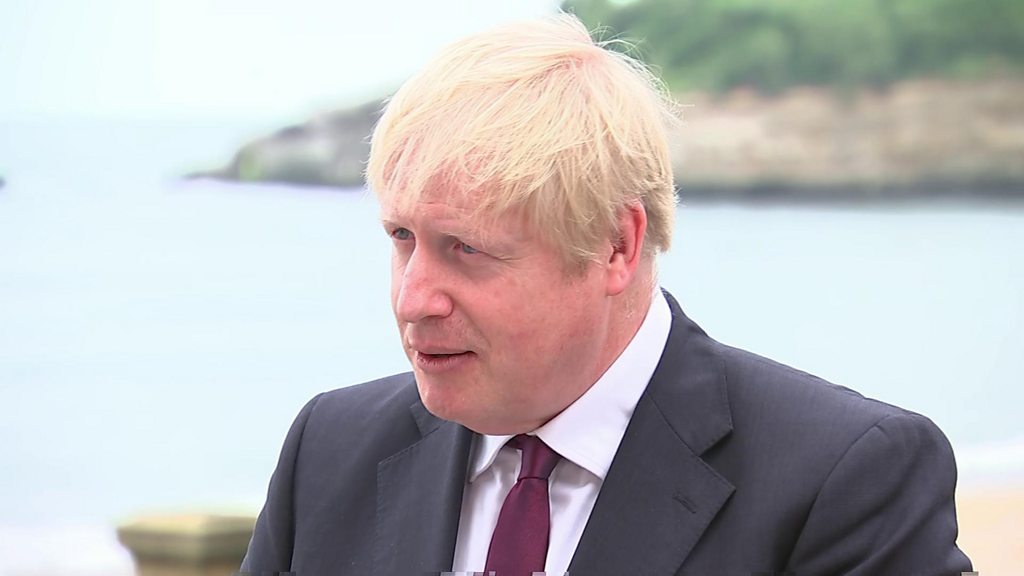Andrew Harnik AP
BIARRITZ, France — President Trump began his final day at the Group of Seven summit complaining about the media but offering scant evidence that he and other world leaders gathered in France had made any progress on tackling major global challenges that range from a slowing economy to nuclear proliferation.
The president took to Twitter to offer a retort to news coverage that has been dominated by the Trump administration’s muddled messaging about the trade war with China and the arrival of Iran’s foreign minister at the G-7 on Sunday.
“In France we are all laughing at how knowingly inaccurate the U.S. reporting of events and conversations at the G-7 is,” Trump tweeted early Monday. “These Leaders, and many others, are getting a major case study of Fake News at it’s finest! They’ve got it all wrong, from Iran, to China Tariffs, to Boris!”
But as the summit entered its final day, there was little sign that Trump and other world leaders had reached anything nearing a consensus on thorny issues including trade, climate change, and how to deal with Iran, North Korea and Russia.
Illustrating the divide between Trump and the other leaders meeting in the resort town, the French all-but-abandoned efforts to craft a joint statement at the end of the summit, cognizant of how the United States is drifting further away from other nations on a growing number of issues.
Negotiators from each country talked trade and other issues late into the night, but the U.S. delegation blocked any consensus, a senior European official said, speaking on condition of anonymity to discuss the closed-door discussions.
Monday was set to be pivotal day for the leaders, as they sought to cap a summit marked more by whiplash, mixed signals and surprises than by concrete results.
Trump was scheduled to meet Monday with Egyptian President Abdel Fatah al-Sissi, German Chancellor Angela Merkel and Indian Prime Minister Narendra Modi. He also planned to attend working sessions on climate change and the digital economy. Trump planned to wrap up the summit with a joint news conference with French President Emmanuel Macron before returning to Washington.
He signaled on Monday that trade deals were in motion.
“China called,” Trump said. “They want to make a deal.”
And he also sought to boost a potential trade deal with Japan that he announced the previous day along side Japanese Prime Minister Shinzo Abe, saying that it would boost automobile manufacturing in the United States.
Philippe Wojazer
Reuters
French President Emmanuel Macron walks near the summit venue during the G7 summit in Biarritz, France, Au. 26, 2019.
Despite the White House’s efforts to refocus the discussion on the global economy, Trump’s own muddled messaging — and a guest unexpected by most — largely disrupted those plans Sunday.
[Mixed signals, reversals cloud second day of G-7 summit]
The president signaled regret for his trade war with China on Sunday only to have the White House reverse his position hours later. Trump was contradicted in public by several world leaders, who disagreed with his positions on trade, Russia’s expulsion from the G-7 and North Korea’s missile tests. After he claimed that a new trade deal with Japan would lead to the country buying “massive” amounts of agricultural products from the United States, Japanese Prime Minister Shinzo Abe clarified that any purchases would be made by the private sector — rather than directed by the government.
“The Japanese private sector listens to the Japanese public sector very strongly,” Trump retorted.
Further adding to the tensions, Iranian Foreign Minister Mohammad Javad Zarif made a surprise visit to Biarritz on Sunday, which dominated news coverage on a day the United States had sought to focus the gathering on the economy.
[Iran’s Zarif makes surprise trip to G-7, catching Trump off-guard]
Trump said that Macron had asked him over a Saturday lunch whether it would be okay to invite Zarif the following day.
Macron “spoke to me, he asked me. I said, ‘If you want to do that that’s okay.’ I don’t consider that disrespectful at all, especially when he asked me for approval,” Trump said Monday.
“I think it’s too soon to meet, I didn’t want to meet,” Trump said. But he said “it’s truly going to be time to meet with Iran” soon.
By Sunday night, Trump had largely moved on from the planned focus on the global economy. He spent much of the evening retweeting several conspiracy theories alleging corruption and malfeasance at the FBI.
In one post related to the G-7, the president amplified the commentary of a libertarian Canadian media personality who accused Canadian Prime Minister Justin Trudeau of “assuming a submissive position” in meetings with Trump despite “trash-talking” him in Canada.
“No, we actually had a very good and productive meeting. Nice!” Trump tweeted, in a post that also served to broadcast the original tweet — with a picture a cross-legged Trudeau sitting next to a stern-looking Trump — to the president’s 63 million followers.
Markus Schreiber
AP
Britain's Prime Minister Boris Johnson, center, walks along the seafront in Biarritz, France ahead of the third and final day of the G-7 summit, Monday, Aug. 26, 2019.
After the G-7 last year in Canada, Trump dramatically withdrew his support for a joint communique after watching Trudeau give a news conference in which he spoke negatively about U.S. tariffs.
Trump tweeted at the time that Trudeau “acted so meek and mild during our @G7 meetings” and then gave a combative news conference “after I left.”
Macron abandoned the idea of trying to convince Trump to sign on to a joint communique this year, deeming the effort “pointless.” The symbolic statements are typically issued at the end of global summits, but U.S. officials have resisted in recent years.
French officials realized well in advance that the Trump administration had no interest in agreeing to a joint statement, and they began dialing back expectations.
The move reflects Trump administration’s belief that it does not need to coordinate its policies with other leaders, particularly on issues that the president feels strongly about, such as trade. But it also could make it more difficult for leaders to address problems as they arise because they aren't starting from the same level of understanding.
[Britain’s Johnson offers rare — yet gentle — jab to Trump on China trade war]
It also shows how other world leaders are growing more comfortable separating themselves from the United States on policy issues, said Brian Klass, who teaches global politics at University College London.
“People are making nice publicly,” he said. “But I think privately, most in the G-7 are panicking about what Trump’s doing with the trade war, they are panicking about his increasingly erratic behavior and wondering whether they can continue to behave as if everything is business as usual.”
Read more:
Trump removes U.S. from G-7 joint statement over escalating feud with Canada’s Trudeau
Donald Trump may have killed the G-7 communique. Will anyone miss it?
Today’s coverage from Post correspondents around the world
Like Washington Post World on Facebook and stay updated on foreign news
https://www.washingtonpost.com/politics/g-7-summit-set-to-end-with-little-consensus-amid-trumps-mixed-messaging-on-the-trade-war/2019/08/26/c73b49ac-c76d-11e9-a1fe-ca46e8d573c0_story.html
2019-08-26 07:27:32Z
52780360196843



